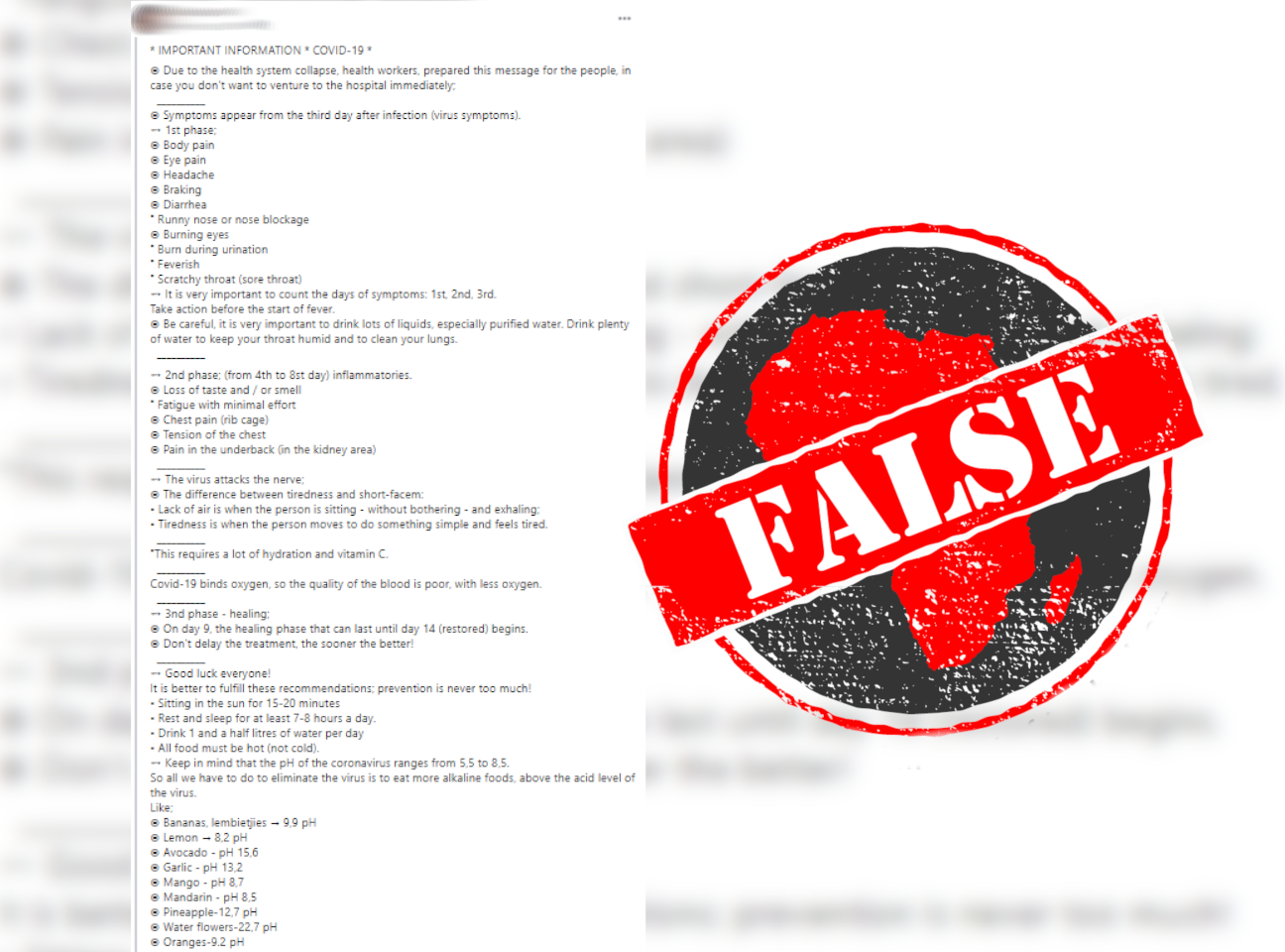Lees hierdie verslag in Afrikaans.
As South Africa battles a third wave of Covid-19, a message posted on Facebook claims to give “belangrike inligting” or “important information” about the coronavirus.
It then in Afrikaans lists a number of Covid symptoms and suggests several methods for preventing the disease. These include eating alkaline foods, sitting in the sun every day, and eating only hot food.
But much of the advice in the post, which has been shared thousands of times, is incorrect. Africa Check has debunked variations of it in the past, in a number of English-language messages widely shared on social media.
We revisited our findings.

Alkaline food won’t prevent Covid-19
The post claims that the Sars-CoV-2 virus, which causes Covid-19, has a unique pH level, and “al wat ons dus moet doen om die virus uit te skakel, is om meer alkaliese kosse te eet”.
This means: “Therefore all we need to do to get rid of the virus is to eat more alkaline foods.”
This is false, and has been widely debunked. Africa Check tackled the claim as far back as March 2020.
Oyewale Tomori, professor of virology with the World Health Organization (WHO), told us: “Coronavirus has nothing to do with the stomach, so how do these ‘alkaline foods’, like lemon, lime, avocado and garlic, beat the virus?”
He said the claim should be ignored.
In addition, the pH values of the “alkaline foods” listed are wildly incorrect. They seem to have been copied directly from older versions of this misleading post.
Lemons are listed as having a pH of 9.2, which would make them alkaline. In reality, lemons are acidic and even the simplest experiments reveal they have a pH closer to 2.
The post also appears to have been badly translated into Afrikaans, with foods like “watercress” translated to “waterblomme”. Waterblomme, often called waterblommetjies, are the flowers of a South African pond weed eaten as a vegetable, not a type of cress.
Other measures equally ineffective
The Facebook post also suggests that people sit in the sun for 15 to 20 minutes every day. But this will do nothing to prevent the transmission of Covid-19. As the WHO has noted, the disease can be transmitted “in any climate, including areas with hot and humid weather”.
The post also recommends that “alle voedsel moet warm wees (nie koud nie)”, or that foods must be eaten warm, not cold. The US Centers for Disease Control and Prevention (CDC) notes that “there is no evidence to suggest that handling food or consuming food is associated with Covid-19”.
A Reuters fact-check also found that warm foods, sunlight and an alkaline diet would not prevent Covid-19.
Reuters also investigated other precautions suggested. It notes that while vitamin C, regular sleep and drinking water can keep you healthy and help you recover faster from illness, these measures cannot prevent or cure Covid-19.
Symptoms of Covid-19
The post lists several symptoms of Covid-19, and it gets many of them right, although there is no evidence that symptoms appear in three distinct phases.
The CDC says that symptoms may appear any time within two to 14 days after exposure to the Sars-CoV-2 virus.
The WHO lists the most common symptoms of Covid-19 as fever, dry cough, and tiredness. But not everyone will show all of these symptoms.
Other symptoms which may affect some but not all people include “loss of taste or smell, aches and pains, headache, sore throat, nasal congestion, red eyes, diarrhoea, or a skin rash”.
Muscle aches are not only around the kidneys, as the Facebook post suggests. And the CDC and WHO do not list a burning feeling during urination as a symptom of Covid. Follow the recommendations by trusted health authorities to prevent and treat Covid, not anonymous messages posted on social media.
Republish our content for free
For publishers: what to do if your post is rated false
A fact-checker has rated your Facebook or Instagram post as “false”, “altered”, “partly false” or “missing context”. This could have serious consequences. What do you do?
Click on our guide for the steps you should follow.
Publishers guideAfrica Check teams up with Facebook
Africa Check is a partner in Meta's third-party fact-checking programme to help stop the spread of false information on social media.
The content we rate as “false” will be downgraded on Facebook and Instagram. This means fewer people will see it.
You can also help identify false information on Facebook. This guide explains how.





Add new comment